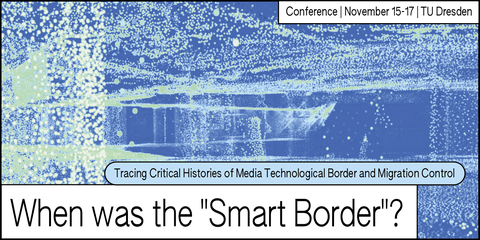22.08.2023
Conference "Smart Borders" | A collaboration between TU Dresden & LSE | 15-17 November 2023
Conference Concept
The buzzword “smart borders” commonly captures the widespread digitalization and automation of migration control and the expansion of racial capitalist security regimes by technological means. Yet, the term describes only the most recent instance of media technologies constituting and enabling state bordering. While states around the world rely on and invest in ever newer “smart” technologies to control migration, these developments stand in longer historical continuities, not least hailing from projects of mobility and population control of colonialism, racism, eugenics, or carceral regimes (Chaar-López, 2019; Weitzberg, 2020; Pfeifer, 2021; Leurs & Seuferling, 2022; Tazzioli, 2023).
This conference aims to address the international research field on temporalities and histories of smart borders, to trace genealogies and longue durées of media, communication, and information technologies in the control of borders and migration. Such histories can be traced on different levels: materialities of media technologies, uses and practices around them, struggles against bordering tactics and technologies, as well as socio-technical imaginaries of what these technologies can and cannot do – all of which are characterized by continuities and change. While media shape borders across time, media technologies are also shaped by and emerge from projects of bordering. In this sense, borders can be better understood by attending to their media, and vice versa, media histories more generally can be explored at the border – a “technological testing ground” (Molnar, 2022) historically and today.
Questions guiding the conference are:
- How can we understand histories of the “smart border” within histories of media technology and digitalization, as well as within histories of territorialization, biopolitics, racial capitalism, colonialism, and bordered states?
- How are technological innovation as well as processes of digitalization and computation historically tested, developed, and trialed in the context of border and migration control?
- How has the entanglement of media technologies with borders evolved over time?
- How can historical perspectives on smart borders advance critiques of violence and discrimination enacted by smart border regimes today?
For more information visit the event page here

